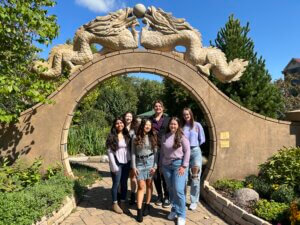UW-La Crosse Asian Latinx African Native American+ Womxn group offers opportunity to explore identity
July 11, 2024
| By La Crosse Community Foundation |
ALANA, an inclusive, empowering space

Anika Oplanic, second from left, is co-chair of ALANA at UWL. ALANA, which stands for Asian Latinx African Native American+ Womxn, serves as a safe space for women of color and their allies.
At the University of Wisconsin – La Crosse, ALANA is more than an acronym. It’s an organization created for Asian Latinx African Native American+ Womxn to serve as an inclusive and empowering space for women of color and their allies on campus. They aim to foster a supportive community that educates and advocates for issues significant to women of ALANA descent through an intersectional framework. This framework recognizes and addresses the multiple aspects of identity that enrich people while exposing them to varying forms of discrimination and disadvantage.
Anika Oplanic co-chairs ALANA at UWL and has experienced firsthand how such a supportive community can help mitigate the challenges of different identities, backgrounds and perspectives.
What challenges frequently arise from differences in identity, background, and perspective?
Speaking from personal experience, I joined ALANA my freshman year. I am from the west Chicago suburbs. I am a biracial woman, Filipina on my mom’s side and Croatian on my dad’s side. I grew up surrounded by both sides of my family. My hometown was predominately White but much more diverse than LAX. We had a Filipino Culture Club at my high school, and I always felt connected to my peers. However, when I came to La Crosse, there was a lot of ignorance and discrimination I was suddenly exposed to. Values and morals I had always viewed as common sense suddenly weren’t common sense for others. Mocking accents and racial stereotypes were “just jokes,” and I was apparently in the wrong for calling people out. Constantly educating others — holding panels, running ALANA meetings, educating classmates in class discussions, meeting with professors about their pedagogy practices — became exhausting. ALANA was my relief from this; I reconnected with other multicultural students who had experienced similar things. I found a family in our multicultural student organizations, and I would not be half as successful in this work without their support. In summary, I think the biggest challenges I see our members experience are frustration with ignorant peers, blunt discrimination, and frustration with the way institutions “handle” these issues.
How does ALANA successfully use social capital to advance intersectional feminist goals in the community?
We use social capital to develop trust and relationships, educate ourselves, build partnerships and take action in our community.
For example, over the past two years, ALANA has focused on self-love to reduce the fatigue of educating about POC issues at predominantly white institutions. Activities like making intention candles and vision-board nights fostered camaraderie and comfort among members, setting the stage for deeper discussions and stronger connections with each other and the executive team.
Each week, we celebrate impactful women of color, like Queen Lili’uokalani, to integrate historical and contemporary issues, such as the native Hawaiian housing crisis. These sessions increase ALANA members’ understanding of diverse histories and current struggles through discussions and cultural expressions like poetry and music.
This year, we worked to build social capital by bringing back Building Sisterhood Sessions, where we explore topics like intersectional feminism, deepening bonds among members and enhancing personal beliefs. These discussions focus on representation issues and develop a supportive network, fostering personal and collective growth.
ALANA also partners with local leaders like Choya Woods to emphasize self-respect and community connection. Hosting events like a women of color-owned business fair at the Phenomenal Women’s Dinner strengthens ties with local entrepreneurs, celebrating and uplifting women of color within the community.
How do you know you’re making a difference?
Some might say you can see the difference in membership: ALANA grew from two members per meeting my freshman year to 30 per meeting my junior year. Others might say it’s the difference in community support: ALANA’s Phenomenal Women’s Dinner had 60 attendees my freshman year, and this year, we sold out of 120 tickets. However, I see the difference I make in our members. ALANA has a niche outreach: we are the only UWL organization that specializes in representing women of color on campus. This year, I connected with a freshman student who was frustrated with NASA (Native American Student Organization) becoming inactive a few years ago (due to lack of student interest). She joined ALANA, and we worked on restarting NASA. It became active this semester. She recently shared at a panel that ALANA was the first place she felt seen on campus, the first place she felt connected – and that is all I could ever want to hear as a leader.
Reprinted with permission from the La Crosse Tribune.
